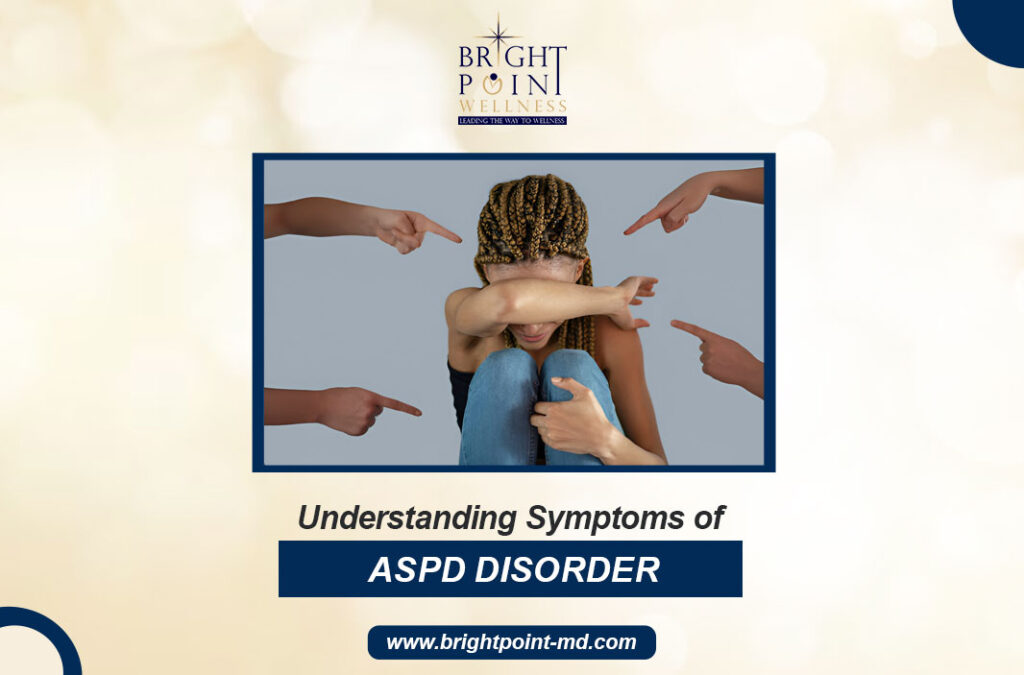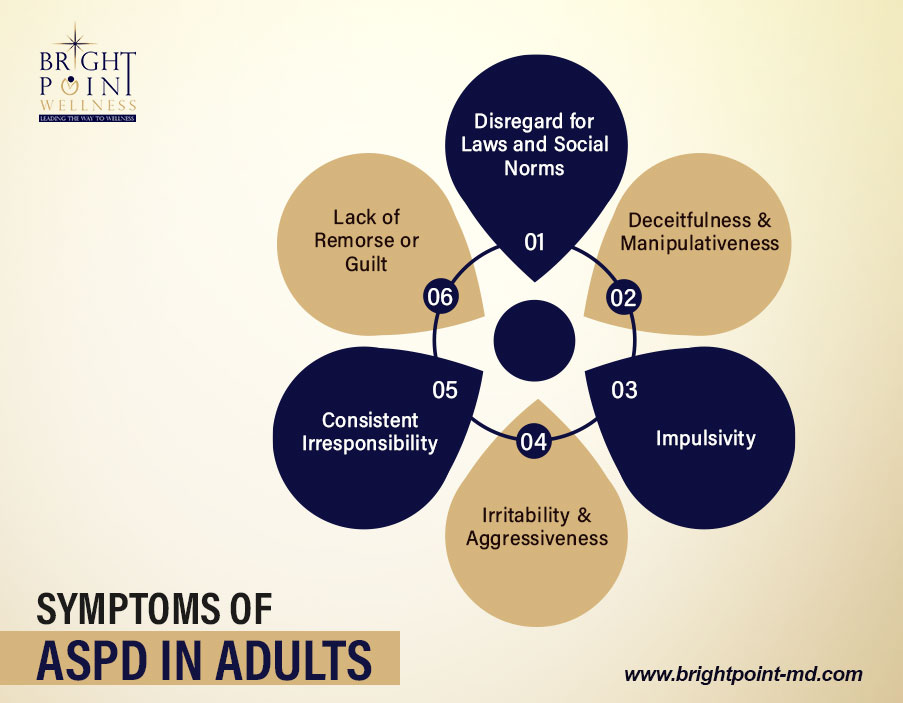
Antisocial Personality Disorder (ASPD) is a serious, persistent pattern of behaviour in which a person repeatedly disregards or violates the rights of others. This pattern often begins in childhood or adolescence and continues into adulthood, showing up as lying, stealing, aggression, manipulation, and little or no guilt or remorse.
Moreover, in this article, Symptoms of Antisocial Personality Disorder are introduced up front so readers and search engines immediately see the topic and intent.
What is Antisocial Personality Disorder?
Antisocial Personality Disorder is a severe psychiatric illness that is described as a pattern of violating the rights of others and/or ignoring them repeatedly. It usually starts at an early age, during childhood or adolescence, and persists into adulthood.
Individuals with ASPD have difficulty adapting to societal and legal demands and ethical standards. They will constantly indulge in actions like lying, stealing, aggression, and manipulation, among others,s and most of the time they experience no guilt or shame.
The causes of ASPD are not fully known, but it is thought to occur due to a combination of all these factors acting together. As an example, children who have experienced trauma, neglect, or abuse are at a higher risk, as is a family history of personality disorders or other mental illnesses.
Symptoms of Antisocial Personality Disorder in Adults
The symptoms of ASPD disorder can differ in their severity and appearance, but usually contain the following core symptoms:
1. Disregard for Laws and Social Norms
In ASPD, people are in constant violation of laws and norms of social conduct, often committing an offense that can lead to arrest, e.g., theft, vandalism, or physical assault. The trend is not sporadic but regular, and more often than not, begins during the adolescence stage.
They will also be openly disrespectful towards authority, and they think the rules do not apply to them. The result of this negligence is that they hardly learn through punishment or the impact of the law.
2. Deceitfulness and Manipulativeness
Constant lying, conniving, and cheating other people to get personal profit or enjoyment are typical features. People with ASPD disorder are inclined to lie, have false names, and to play on the emotions of others to take advantage of them.
Whereas this dishonesty is frequently premeditated as opposed to spontaneous, which shows a cold, strategic, self-serving way to achieve their needs. Only later on, others may find it hard to figure out their actual intentions because they are very superficial and late.
3. Impulsivity
ASPD individuals are mainly the ones to follow through with actions without thinking everything over first. Such instability also affects their job changes (rapid changes of jobs), financial irresponsibility, or even risky sexual behaviors.
So, it indicates weak discipline and impulse, as well as failing to think forward to see long-term decisions of the action, which might be the cause of inconsistent or disorderly lives. This symptom is related to repeated troubles in law or in personal life.

4. Irritability and Aggressiveness
They tend to be frequently irritable, exhibit anger outbursts, or be aggressive. This may get to the level of fighting and assaults. The irritability can be attributed to low frustration tolerance and a general approach to perceiving other people as threats or annoyances.
They are also disproportionately aggressive most of the time, and this can result in social and legal problems.
5. Consistent Irresponsibility
A person with ASPD does things that lead to danger to themselves and to others. This is either reckless driving, abuse of substances, unsafe sex, or neglecting dependents. They can demonstrate that they do not care about what happens to them.
They may take emotionally cruel decisions without caring about the possible outcomes of their actions, or they may insensitively pretend that no serious consequences follow their actions.
6. Lack of Remorse or Guilt
The lack of feeling an emotion such as remorse or guilt after causing pain to others is one of the chief characteristics of ASPD. They tend to rationalize or victim-blame even when they bring about a lot of damage.
The inability to empathize produces the inability to have a meaningful relationship or a sense of conscience that directs one on how they should behave morally.
What are the Types of Aspd
While these traits generally define ASPD, it can manifest in different ways:
Psychopathic Type
The psychopathic variation of the Antisocial Personality Disorder has a set of innate characteristics that would include the absence of empathy, acting superficially charming, and being manipulative. People belonging to this type are cold, calculating, and usually more dangerous in themselves.
Sociopathic Type
The sociopathic kind typically develops as a result of environmental circumstances such as childhood abuse. Individuals with this subtype are less thoughtful and more impulsive and emotionally reactive, and they tend to have angry outbursts, along with unpredictable behavior.
Dyssocial Type
The dyssocial form involves having antisocial conduct acquired through the social or cultural surroundings. These behaviors are ingrained by individuals in the group or peer influences, as they believe in the social norms in promoting such behaviors.
ASPD Autism Spectrum Disorder (ASD): Key Differences
ASPD is a personality disorder that is typified by long-term behaviour that encompasses violating the rights of other people, deceitfulness, and impulsivity or lack of empathy or remorse. Individuals with ASPD also tend to have manipulative, violent, or criminal behavior without feeling bad about it.
Autism Spectrum Disorder (ASD) is a brain development disorder that is characterized by an impairment in social communication, limited interests, and repetitive behaviors. In contrast to ASPD, ASD patients do not harm others with the intent to do so, and they usually lack the understanding of social interactions, but not out of evil.
Treatments for Antisocial Personality Disorder
Antisocial personality disorder treatments are problematic since the affected individuals do not perceive their behavior as abnormal and might be opposed to therapy. There is no cure, yet there are some treatments that can assist to managing symptoms:
- Psychotherapy: Talk therapies, particularly cognitive-behavioral therapy (CBT), can make people aware of their self-destructive tendencies, instill empathy, and install new coping strategies.
- Medications: No medications specifically treat ASPD, but can be prescribed to control the symptoms, such as aggression, irritability, and underlying conditions, such as depression or anxiety.
- Supportive groups: Supportive services focused on finding a home, securing employment, and training in social skills will enhance day-to-day functioning and prevent high-risk behaviours.
How BrightPoint MD Helps with Antisocial Personality Disorder (ASPD)
Bright Point MD offers a holistic, personalized treatment program to treat someone with ASPD. They deal with symptoms of the disorder, often prescribing medication and providing talk therapy and even intensive outpatient programs to control symptoms of impulsiveness, aggression, and emotional detachment.
Bright Point MD is also equipped with the knowledge to support co-occurring concerns such as substance abuse, thereby benefiting social functioning and discouraging risky actions. This comprehensive care assists the clients to stronger coping skills and leads to the creation of long-term behavior change.
Conclusion
The impact of SPD on the individual disrupts their families, friends, and the community in which they live. Friends and family can feel anger, disappointment, and pain due to the behavior of an individual and their indifference.
Learning information about the disorder is beneficial to caregivers and families so that they can be enlightened on the disorder and have strategies for coping with the behaviors. Self-improvement through learning to control impulses, socialize, and be responsible can benefit the individual. Social or community interventions in other cases may be required to achieve safety.
FAQs
What types of therapy help with ASPD?
Talk therapy, like cognitive-behavioral therapy (CBT) and holistic approaches such as mindfulness and art therapy, can be effective.
Can medication treat ASPD?
There’s no specific medication for ASPD, but drugs may help manage symptoms like aggression and impulsivity.
How can behavior be managed in ASPD?
Structured outpatient programs and rehabilitation help build coping skills and reduce risky behaviors.
Does therapy help with emotional detachment in ASPD?
Yes, therapy and holistic treatments can improve emotional awareness and interpersonal connections.
Are co-occurring issues like substance abuse common in ASPD?
Yes, and treating these alongside ASPD is essential for better outcomes.








